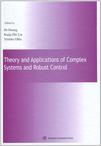复杂系统暨鲁棒控制的理论和应用
出版时间:2010-8 出版社:清华大学出版社 作者:黄杰,刘康志,(日)太田快人 编著 页数:285
内容概要
the japan-china joint workshop on control
was initiated in the august of 2004. the first and second joint
workshops were held in beijing and harbin of china, respectively.
the third joint workshop moved to japan and was held on the 18th of
august, 2009 in fukuoka international conference center, as a part
of sice annual conference of 2009. the third joint workshop was
co-sponsored by the control division of society of instrument and
control engineers, japan (sice) and the technical committee on
control theory of chinese association of automation, china
(caa).
this joint workshop provides a forum for the scientists and
engineers from both japan and china, who are active in the field of
control engineering, to present their most recent research outcomes
and to exchange as well as to share their visions, ideas on control
engineering. the focus of the third joint workshop is on complex
systems and robust control. we are privileged that many world
famous scholars from both sides took part in this workshop and
delivered four keynote speeches. after a full day active
discussion, all participants felt that the presentations in the
workshop were both interesting and inspiring. the publication of a
book of selected papers from this joint workshop will undoubtedly
contribute to the control community of the world. so, the steering
committee decided to publish this book.
this book is organized as two parts: one on complex systems and
another on robust control.
作者简介
作者:黄杰 刘康志 (日本)太田快人
书籍目录
part i theory and applications of complex systems
towards a common principle of biological control -- how control
weaves the string of life
hidenori kimural, shingo shimoda1, lu gaohuai and reiko j.
tanaka2
target localization and tracking with motion sensors
daizhan chengx, bijoy k. ghosh2 and xiaoming hus
network failure locating via end-to-end verification
daizhan cheng1 and yutaka takahashi2
an algebraic solution method of the hamilton-jacobi equation
toshiyuki ohtsuka
stochastic optimal control for a class of manufacturing systems
based on event-based optimization
yanjia zhao, qianchuan zhao and xiaohong guan
computing frequency response gain of controlled spatio-temporal
systems
hisaya fujioka
stability analysis of adrc for nonlinear systems with unknown
dynamics and disturbances
wenchao xue and yi huang
nonlinear output feedback control for saturated systems and its
application
daisuke akasaka and kang-zhi liu
estimation of liss properties via a quadratic form liss-lyapunov
function
shengyu wu and shengwei mei
torque balancing for multi-cylinder si engines and its
experimental validation
po li and tielong shen
experimental validation of robustness of individual air-fuel ratio
control algorithms
yinhua liu1, tielong shen1, di lu2, kenji suzuki3 and kota
sara3
on energy-based control for underactuated mechanical systems
xin xin
passivity based bilateral control for double-screw-drive forceps
teleoperation system with constant time delay
chiharu ishiil, kosuke kobayashi2, yusuke kamei3, yosuke
nishitani4 and hiroshi hashimoto5
identification of respiratory system considering hysteresis of
pulmonary elastance
shunshoku kanae1, zi-jiang yang2 and kiyoshi wada3
part ii theory and applications of robust control
neo-robust control theory -- beyond the small-gain and passivity
paradigms
kang-zhi liu
robust output feedback control of hagc system in gold strip mill
with delayed measurement
xin li, xiaohong jiao and xiaofei liu
a robust adaptive ha control method for robot manipulators with
input nonlinearities
kazuya sato1, takanori nakashima1 and kazuhiro tsuruta2
delay-dependent robust stability criteria for systems with
interval time-varying delay
tao zhang and guokai xu
output feedback h∞ control combining moving horizon scheme for
active suspension based on lmi
juan wang and haiying du
章节摘录
版权页:插图:2 Control as a transdisciplinary principle Control engineering was born at almost the same time as modern technol- ogy was born in the era of Industrial Revolution.So,it is one of the oldest disciplines of engineering,which is consistent with saying“no machine works without control”.Since then,control engineering has been developed in pace with the progress of modern technology and now it reaches a certain level of maturity on which contemporary technology seriously depends,as we notice.A salient characteristic feature of control engineering lies in its universality in the sense that it is used commonly in almost all areas of engineering.En- gineering disciplines are divided into several categories based on the types of energy resources they use;electrical,mechanical,chemical and SO on.Control engineering is out of this categorization.It is used indispensably in these fields and sometimes embedded naturally in these disciplines.We find many other such disciplines,apart from control engineering,namely,systems engineering, network engineering,optimization,design engineering,human/machine inter- face,reliability engineering,and SO on.Now,it is natural to divide engineering disciplines into two categories:The one includes those engineering based es- sentially on the natural sciences whose objectives are to exploit the potentials of Nature for the use of human being,and the other includes those that do not directly related to the Nature,rather related to the artifacts,society and humans.The disciplines included in the former category tend to concentrate on refining each component of systems and promote each specific technology,SO that further ramifications take place.On the other hand,the disciplines in the latter category tend to integrate different disciplines to challenge the problems. We may call the engineering fields contained in the first category applied engineering,while those in the second category pure engineering.The names come from the fact that the disciplines in the first category are essentially regarded as applications of natural sciences,while those in the second category are independent from natural science and are closed within the engineering world.
编辑推荐
《复杂系统暨鲁棒控制的理论和应用》由清华大学出版社出版。
图书封面
评论、评分、阅读与下载
用户评论 (总计0条)
推荐图书
相关图书
- 酒店个性化运作的300个细节
- 每一棵树都很孤独
- 餐饮规范操作的300个细节
- 芒果城
- 大学计算机基础实验教程
- 文心探珠
- 大学计算机应用基础
- (金钻2DVD)国语经典101(1)
- (金钻2DVD)国语经典101(2)
- (金钻2DVD)国语经典101(3)
- 韩宝仪/黑胶碟
- 昕潮男装备实务
- 超实用小烤箱美食
- 欧美乡村民谣1/黑胶碟
- JavaEE程序设计与应用开发
- 建筑胶黏剂和防水密封材料配方与制备
- 四言论语
- 寻找服装品牌的方向
- 武则天评传
- 清华大学2009年人事工作研讨论文选集
- 每个孩子都能有好性格+好人缘
- 从这里走向世界/清华大学国际合作与交流论文集
- 中国徽州文书
- 新课标高中生物必修2
- 我最想要的养颜美容书
